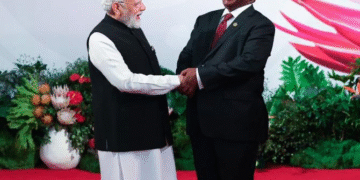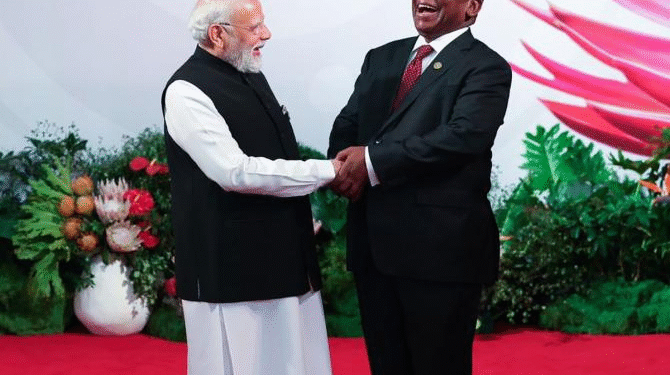South African President Cyril Ramaphosa jokingly told PM Modi that he “might have run away” if he knew hosting the G20 was so difficult. Their lighthearted banter at the summit highlighted strong India–South Africa ties and global cooperation.
Johannesburg, South Africa — In a warm and candid moment during bilateral talks at the G20 Summit in Johannesburg, South African President Cyril Ramaphosa told Indian Prime Minister Narendra Modi with a chuckle, “You should have told us it is such a difficult task, maybe we would have run away.” The comment, made during delegation-level talks, underlined not only the challenges of hosting a G20 summit but also the deep respect South Africa holds for India’s recent stewardship of the global forum.
A Lighthearted Moment Amid High Stakes Diplomacy
Ramaphosa’s quip came at the start of the India–South Africa delegation-level meeting on the sidelines of the G20 summit. He expressed gratitude to India for its support as South Africa embarked on hosting the first G20 summit ever held on African soil.
Laughing alongside him, Prime Minister Modi replied, “Small is always beautiful.” The exchange was clearly in good spirit — but it was also layered with political symbolism and mutual respect.
Learning from India’s Example
Ramaphosa didn’t just joke — he acknowledged that South Africa had much to learn from India’s earlier G20 presidency, especially its 2023 summit in New Delhi, held at the iconic Bharat Mandapam. “We have learned a lot from your hosting … yours was spectacular … ours is really small,” Ramaphosa admitted.
For a nation hosting the summit for the first time, that kind of humility — and acknowledgment — carried substantial weight. The bilateral meeting signaled not just a diplomatic exchange, but a passing of institutional knowledge from one Global South power to another.

Beyond the Banter: Real Diplomatic Substance
While the joke made headlines, the substance of the meeting also held serious gravitas.
- Cooperation Goals: The two leaders discussed strengthening ties in critical areas — from trade and investment to artificial intelligence, digital infrastructure, and critical minerals.
- People-to-People Exchanges: Modi and Ramaphosa emphasized youth exchange, greater collaboration in skills, and people-to-people ties.
- Mutual Support: Modi publicly appreciated Ramaphosa for the warm welcome and thanked South Africa for organizing the summit so successfully.
Why the Banter Matters
On the surface, Ramaphosa’s comment gave the media a fun sound bite — but for policymakers and analysts, it highlighted deeper themes:
- Respect for Institutional Memory: By joking about running away, Ramaphosa was also acknowledging the enormous logistical, political, and financial burden that comes with hosting a major global summit.
- Global South Solidarity: The exchange underscored the cooperation between two leading nations of the Global South. India helping South Africa, and South Africa publicly recognizing that help, strengthens their partnership.
- Soft Power in Action: The moment reinforced how soft diplomacy — humor, humility, and mutual respect — plays a role in high-stakes international summits.
Ramaphosa’s G20 Presidency: Ambitions and Challenges
Hosting the G20 marks a milestone for South Africa. As the first African nation to preside over the G20, Pretoria’s responsibilities were heavy:
- High Expectations: South Africa aimed to spotlight issues like inequality, sustainable development, and climate resilience.
- Criticism and Boycotts: The summit has not been without friction.
- Minerals Strategy: Ahead of the summit, South Africa negotiated deals on critical minerals — a key leverage point for its economic future.

Modi’s Message: A Strategic Blend
Modi’s presence and responses during the meeting also revealed his diplomatic posture:
- By accepting Ramaphosa’s joke with a graceful comeback, Modi reinforced a tone of friendship, humility, and partnership.
- His proposal on the sidelines for deepening digital infrastructure collaboration among IBSA nations (India, Brazil, South Africa) signals India’s vision for a connected Global South.
- At the G20, Modi also pushed for a fund for climate-resilient agriculture, underscoring his agenda on sustainability.
Global Reactions & Analysis
The banter earned wide coverage from media outlets and analysts alike:
- India Today reported on the candidness of Ramaphosa’s remark and how it highlighted his respect for India’s prior G20 hosting.
- Business Today and other outlets noted that beneath the laughter, there was a serious acknowledgment of the challenges associated with hosting such a summit.
- Observers say that the lighthearted tone helped ease the tension around serious debates on multilateralism, climate, and economic development.
The Broader Strategic Significance
Ramaphosa’s comment — “maybe we would have run away” — resonates on more than one level:
- Diplomatic Trust: It shows that the leaders feel comfortable enough with each other to speak honestly, even jokingly, in high-stakes settings.
- Institutional Continuity: South Africa’s presidency is partly built on lessons from previous G20 summits, especially India’s 2023 one.
- Soft Power Leverage: Through humor and humility, both leaders reinforced their countries’ soft power — as approachable yet serious players on the global stage.
Looking Ahead
As the G20 Summit in Johannesburg wraps up:
- South Africa’s legacy as host will likely revolve around its efforts to center African growth on the global economic agenda.
- India’s role, as mentor and partner, may deepen, especially as cooperation around technology and critical minerals becomes more structured.
- The tone set by Ramaphosa and Modi might shape future engagements, emphasizing collaborative leadership among Global South nations.
Conclusion
In one short but memorable exchange, President Ramaphosa encapsulated both the enormity of the G20 hosting challenge and his respect for India’s role in helping navigate it — all while injecting a moment of warmth and levity. Modi’s gracious comeback, “Small is always beautiful,” reinforced the tone of cooperation and camaraderie. More than just diplomatic theater, the banter symbolized a broader narrative: that of a rising Global South, helping each other shoulder the burden of global leadership — and doing so with humility, humor, and mutual respect.















 Categories
Categories









